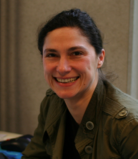Name: | Regina Luttge TU Eindhoven r.luttge +31-(0)40-247 5235 | |
Research
I became very attracted to utilise my knowledge in the field of medical and biochemical applications. Financially supported by a VENI-grant via STW, I am currently investigating nanostructured surfaces, which are made by various techniques (see Figure 1). I think that these structures three-dimensionally confine (bio)chemical reactions yielding higher or at least more accurate conversion and selectivity. At the length scale of individual molecules relevant physico-chemical effects can be studied, for example, by Inelastic Electron Tunneling Spectroscopy (IETS), a technique being used a lot in nanoelectronics.
Combining large-area nanostructuring with IETS may lead to a statistically relevant interpretation of the properties of molecular assemblies at such nanoconfined surfaces. The results may present us with a fingerprint of the individual molecules in the nanoassemblies. These findings will also contribute to the better understanding of shape-selective processes.
In my vision, many diseases may be treated by locally defined stimulation of brain tissue controlling the biosignalling cascade of cells in-vivo. My interest is focused on the design and fabrication of a nanosystem, which electrically controls the molecular conformation at the interface between a man-made device and biological material. Figure 2A-F envisions such triggered interaction cascade by definition and transduction of the proper biochemistry at the device surface.

Figure 1: Various concepts of micro-and nanofabrication techniques.

I am engaged in a number of projects linked to the field of Lab-on-a-Chip as a platform technology. In this area of work, carried out at MESA+ Institute for Nanotechnology, I aim for the integration of components manufactured at the micro-and nanoscale to higher functional devices following the approaches of formal design. The success of higher architecture systems goes hand in hand with the fundamental understanding of the phenomena occurring at the small scale. My expertise extends from the definition of fabrication techniques in glass, silicon and plastics to the investigation of chip-based microfluidics for applications at the Point-of-Care, including microneedle arrays for novel skin patches. The utilisation of these research results towards product development was awarded by STW with valorisation grant phase 1 and 2 helping to initiate two new start-up companies (Medimate and MyLife Technologies) aiming for medical devices based on Lab-on-a-Chip platform technolgy.
I finalized my PhD-project in 2003 at the University of Londen (Imperial College), UK in the Optical and Semiconductor Devices Group. My thesis was dedicated to the investigation of fabrication technologies for optical scanners based on micromachined cantilevers in the research area of microopto-electromechanical systems (MOEMS).
Professional record
1994-1999 Employment as technical staff member, Department of x-ray lithography, Institut für Mikrotechnik Mainz GmbH, D (full time, fixed-term) and Assistant lecturer for Electrical Measurement Techniques, University of Applied Sciences Wiesbaden, D (1994-1995).
1999-2003 PhD-candidate at University of London, Imperial College, UK.
2001-2003 Employment as research assistant (full time, fixed-term) at MESA+ Institute for Nanotechnology, Faculty of Electrical Engineering, Mathematics and Computer Science, University of Twente, The Netherlands and PhD candidate at the University of London.
2003-2007 Postdoctoral Fellow at MESA+ (full time, fixed-term).
2007 Assistant Professor at Mesoscale Chemical Systems, Faculty of Science and Technology, University of Twente (full time, tenure-track).
Selected Publications
Luttge, R., Berenschot, E.J.W., de Boer, M.J., Altpeter, D.M., Vrouwe, E.X., van den Berg, A., Elwenspoek, M.
Integrated lithographic molding for microneedle-based devices
(2007) Journal of Microelectromechanical Systems, 16 (4), pp. 872-884.
Le Fèbre, A.J., Luttge, R., Abelmann, L., Lodder, J.C.
Field emission to control tip-sample distance in magnetic probe recording
(2007) Journal of Physics: Conference Series, 61 (1), art. no. 135, pp. 673-677.
Verbaan, F.J., Bal, S.M., van den Berg, D.J., Groenink, W.H.H., Verpoorten, H., Lüttge, R., Bouwstra, J.A.
Assembled microneedle arrays enhance the transport of compounds varying over a large range of molecular weight across human dermatomed skin
(2007) Journal of Controlled Release, 117 (2), pp. 238-245.
Vrouwe, E.X., Luttge, R., Vermes, I., Van Den Berg, A.
Microchip capillary electrophoresis for point-of-care analysis of lithium
(2007) Clinical Chemistry, 53 (1), pp. 117-123.
Fox, M.B., Esveld, D.C., Valero, A., Luttge, R., Mastwijk, H.C., Bartels, P.V., Van Den Berg, A., Boom, R.M.
Electroporation of cells in microfluidic devices: A review
(2006) Analytical and Bioanalytical Chemistry, 385 (3), pp. 474-485.
Valero, A., Merino, F., Wolbers, F., Luttge, R., Vermes, I., Andersson, H., Van Den Berg, A.
Apoptotic cell death dynamics of HL60 cells studied using a microfluidic cell trap device
(2005) Lab on a Chip - Miniaturisation for Chemistry and Biology, 5 (1), pp. 49-55.
Wolbers, F., Valero, A., Andersson, H., Luttge, R., Van Den Berg, A., Vermes, I.
Apoptosis induced kinetic changes in autofluorescence of HL60 cells - Application for single cell analysis on chip
(2004) Nederlands Tijdschrift voor Klinische Chemie en Laboratoriumgeneeskunde, 29 (5), pp. 296-297.
Gardeniers, H.J.G.E., Luttge, R., Berenschot, E.J.W., De Boer, M.J., Yeshurun, S.Y., Hefetz, M., Van't Oever, R., Van Den Berg, A.
Silicon micromachined hollow microneedles for transdermal liquid transport
(2003) Journal of Microelectromechanical Systems, 12 (6), pp. 855-862.
Lüttge, R., Adam, D., Burkhardt, F., Hoke, F., Schacke, H., Schmidt, M., Wolf, H., Schmidt, A.
40 keV Shaped electron beam lithography for LIGA intermediate mask fabrication
(1999) Microelectronic Engineering, 46 (1), pp. 247-250.

